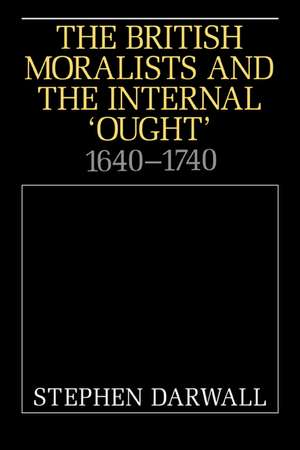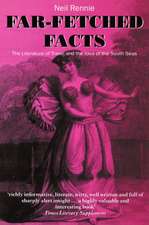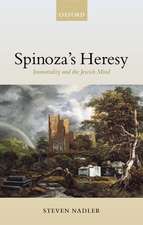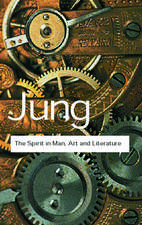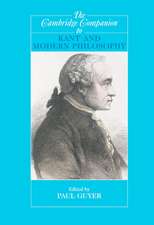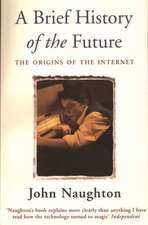The British Moralists and the Internal 'Ought': 1640–1740
Autor Stephen Darwallen Limba Engleză Hardback – 25 mai 1995
| Toate formatele și edițiile | Preț | Express |
|---|---|---|
| Paperback (1) | 356.37 lei 43-57 zile | |
| Cambridge University Press – 27 apr 1995 | 356.37 lei 43-57 zile | |
| Hardback (1) | 690.24 lei 43-57 zile | |
| Cambridge University Press – 25 mai 1995 | 690.24 lei 43-57 zile |
Preț: 690.24 lei
Preț vechi: 775.55 lei
-11% Nou
Puncte Express: 1035
Preț estimativ în valută:
132.12€ • 143.56$ • 111.05£
132.12€ • 143.56$ • 111.05£
Carte tipărită la comandă
Livrare economică 21 aprilie-05 mai
Preluare comenzi: 021 569.72.76
Specificații
ISBN-13: 9780521451673
ISBN-10: 0521451671
Pagini: 372
Dimensiuni: 160 x 236 x 27 mm
Greutate: 0.71 kg
Ediția:New.
Editura: Cambridge University Press
Colecția Cambridge University Press
Locul publicării:New York, United States
ISBN-10: 0521451671
Pagini: 372
Dimensiuni: 160 x 236 x 27 mm
Greutate: 0.71 kg
Ediția:New.
Editura: Cambridge University Press
Colecția Cambridge University Press
Locul publicării:New York, United States
Cuprins
1. The British moralists: inventing internalism; 2. Culverwell and Locke: classical and modern natural law; 3. Hobbes: ethics as 'consequences from the passions of men'; 4. Cumberland: obligation naturalised; 5. Cudworth: obligation and self-determining moral agency; 6. Locke: autonomy and obligation in the revised Essay; 7. Shaftesbury: authority and authorship; 8. Huteson: moral sentiment and calm desire; 9. Butler: conscience as self-authorising; 10. Hume: norms and the obligation to be just; 11. Concluding reflections.
Recenzii
'Positive Psychology begins with Frances Hutcheson early in the Scottish Enlightenment. Michael Gill's lucid exposition of the heavyweight thinkers of this movement is the place to begin to understand this crucial period of intellectual history.' Martin Seligman, University of Pennsylvania
'In Michael Gill's hands, the 'human nature question' becomes a powerful analytic tool that illuminates all kinds of interesting issues in early modern British moral philosophy. This book opens up insufficiently appreciated philosophical texts in ways that are simply wonderful.' Stephen Darwall, University of Michigan
'In this tour-de-force Michael Gill convincingly redefines the course of British moral philosophy over the seventeenth and early eighteenth- centuries. With sure philosophical judgment he weaves his narrative around the oscillation between pessimistic and optimistic views human nature in the major writers of the period, culminating in the cautiously progressive and subtle reconciliation in David Hume. All future work on the history of the Enlightenment, and the philosophy of the time, will need to start with this book.' Simon Blackburn, University of Cambridge
'In Michael Gill's hands, the 'human nature question' becomes a powerful analytic tool that illuminates all kinds of interesting issues in early modern British moral philosophy. This book opens up insufficiently appreciated philosophical texts in ways that are simply wonderful.' Stephen Darwall, University of Michigan
'In this tour-de-force Michael Gill convincingly redefines the course of British moral philosophy over the seventeenth and early eighteenth- centuries. With sure philosophical judgment he weaves his narrative around the oscillation between pessimistic and optimistic views human nature in the major writers of the period, culminating in the cautiously progressive and subtle reconciliation in David Hume. All future work on the history of the Enlightenment, and the philosophy of the time, will need to start with this book.' Simon Blackburn, University of Cambridge
Descriere
This book provides the first study of early modern British philosophy in several decades.
